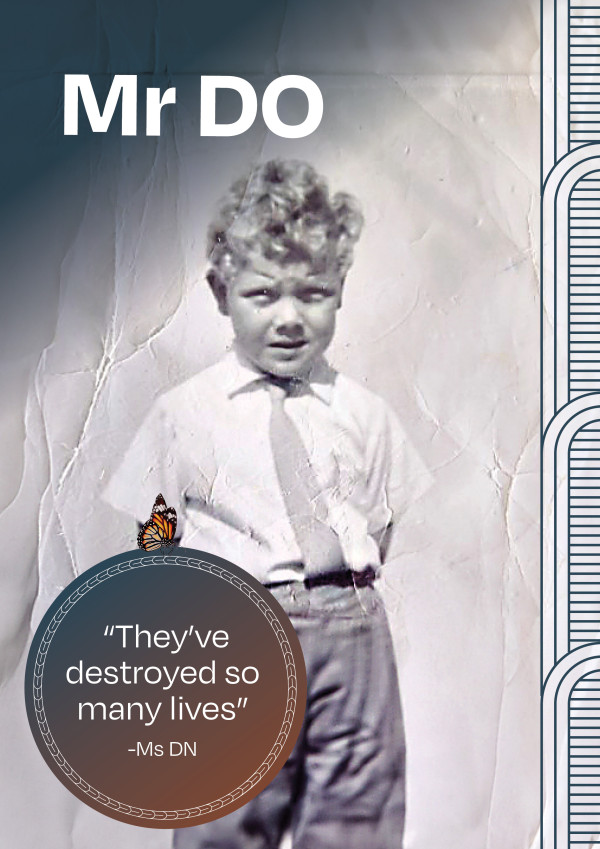Mr Do Ngā wheako o ngā purapura ora - Survivor experience:
|
Name |
Anonymised in order to protect identity of |
|
Age when entered care |
8 years old |
|
Age now |
Deceased |
|
Hometown |
Auckland |
|
Time in care |
1965–1974 |
|
Type of care facility |
Catholic school – Marylands School. |
|
Ethnicity |
Pākehā |
|
Whānau background |
One of 11 children, the only one to go into care. Parents deceased. |

My brother, Mr DO, died in 2022 aged 65 after getting cancer. He was repeatedly anally raped by the brothers at Marylands School, which he attended from the age of eight through to 16.
Doctors said the tumour was a squamous cell carcinoma of the HPV virus and that it was consistent with the abuse he suffered as a child at Marylands.
The look on his face when he said, “I have cancer, don’t I?” just broke my heart.
The tumour was large and wept constantly. My brother was forced to wear large nappies because of faecal incontinence – the doctors were worried that the tumour would come right out of his buttocks. He became unhappy and extremely irritable. In the words of one of my sisters, he lost his spark.
My brother was considered ‘slow’ or ‘behind’. We never got a proper diagnosis but later learned he was born with a congenital intellectual disability. My mother wanted the best education possible for him, and the opportunity for him to go to Marylands, this so-called amazing boarding school, was the answer to our prayers.
My brother’s behaviour changed significantly for the worse because of Marylands. When he came home for visits he didn’t want to go back, so we wouldn’t tell him when it was time to leave again. He would cry a lot, but he couldn’t articulate what was wrong and why he was so distressed. We would send him off with new clothes, toiletries and so on, and he would come back to us wearing someone else’s shoes, no socks, no underwear – and we would have to start all over again. It was incredibly expensive.
We could never have anybody over to our house when he was home for the holidays. We never knew how his behaviour, personal hygiene and toilet skills would be. Looking back, it was obvious he was experiencing bowel problems – he’d go from constipation to diarrhoea. He would soak his underwear and bed linen as he had weeping secretions from his bowels. Sadly, it was a medical condition that could not be washed away – it was probably anal trauma. He had no issues like that before he went to Marylands.
My parents suspected Marylands was neglectful, but the brothers made out as if they were running some type of highly specialised programme that could not be disturbed. My mother visited the school and was appalled, but when she questioned them she was told: “You don’t know how lucky you are to have these brothers caring for your child.” She felt humiliated and she never took it further – you just didn’t question ‘authority’ like that back then.
My brother was totally unprepared to live in the outside world. He couldn’t read or write, he could hardly use a knife and fork. His oral and dental hygiene was truly appalling. Eventually we had his teeth removed and he got dentures. The dentist said it was one of the worst cases of dental neglect he had ever seen.
My brother was a lovely lad. He could be very funny, and ultimately he did amazingly well despite limited to no education and given what happened to him.
It saddens me deeply to know that my brother’s life was cut short because of what happened at Marylands. I am angry and bitter. I always said my brother was never going to be a rocket scientist, but he was funny, charming and loved by all his siblings. He loved telling everybody that he had so many sisters who all fussed over him. He’d say that sometimes all we did was talk and he needed a break from us, which was probably true.
My mother was always told by the Catholic hierarchy that she was lucky the St John of God brothers were there to help boys with disabilities, but sadly they did not live up to their name. They have destroyed so many lives.
[426] Witness statement of Ms DN, WIT0870001 (Royal Commission of Inquiry into Abuse in Care, 30 March 2021).

